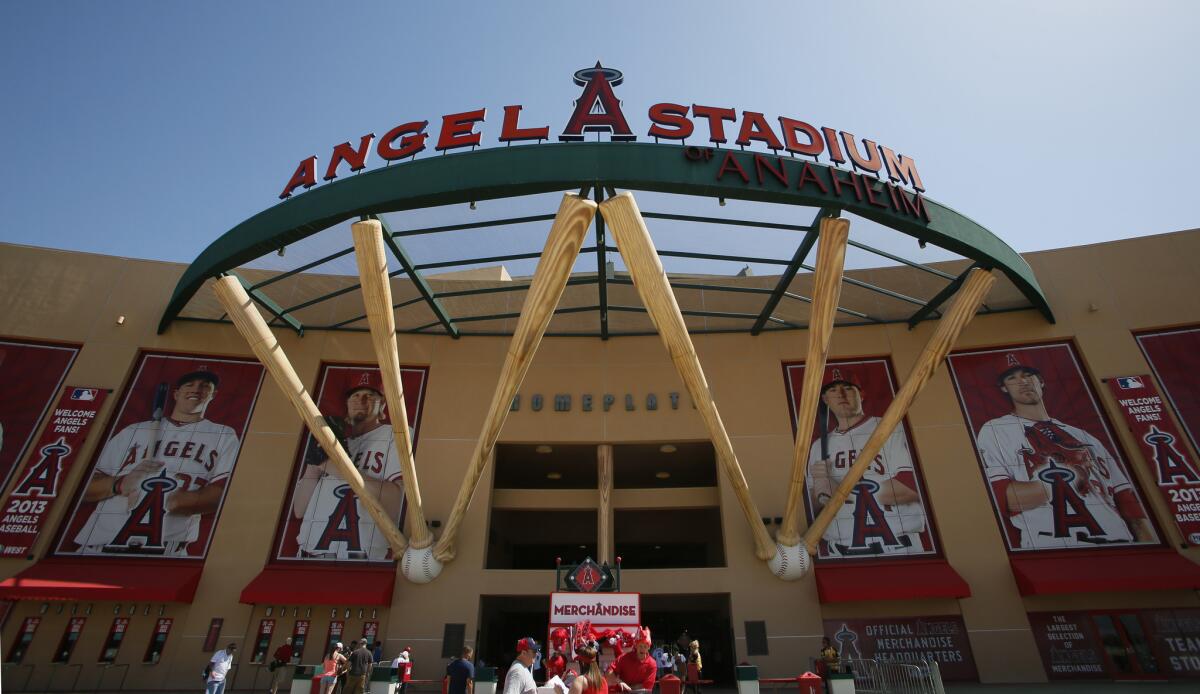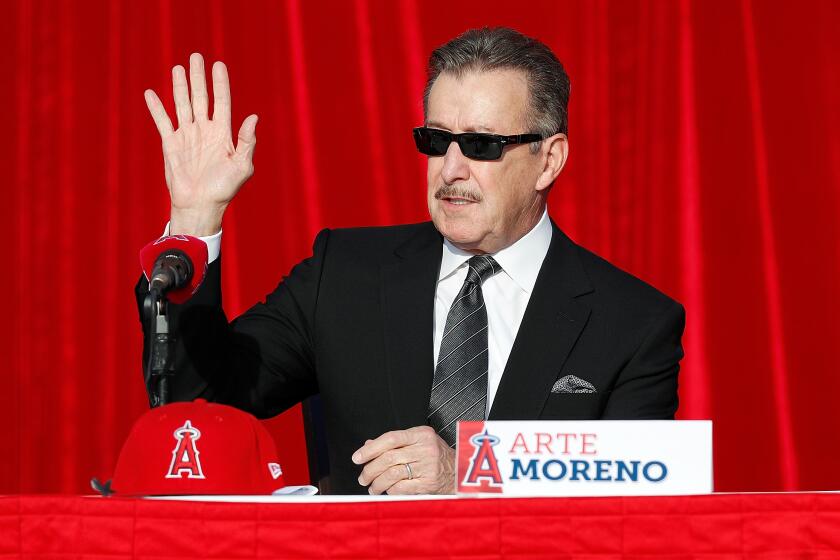Anaheim City Council could approve Angel Stadium sale Friday

On Sept. 3, 2013, the Angels expected the Anaheim City Council to agree to a deal that would have kept the team in town for decades, revitalized Angel Stadium and allowed owner Arte Moreno to build on the surrounding parking lots.
The council disagreed on that deal. Over time, the city and the Angels stopped talking about it. The Angels talked about moving to Tustin and to Long Beach. They took a look at Irvine. They flirted with Los Angeles.
On Friday — 2,299 days later — the Anaheim City Council is expected to agree to a deal that would keep the team in town for decades, revitalize Angel Stadium, and allow Moreno to build on the surrounding parking lots.
The council meeting takes place at 2 p.m. at Anaheim City Hall. The public is invited to attend and speak.
There appears to be little suspense about the outcome of the vote. A majority of council members have indicated their intent to approve the deal.
The outline of the deal is similar to the one that failed six years ago: Moreno would develop the parking lots and use the profits to recoup the cost of rebuilding the stadium, all at no cost to the city.
The previous proposal collapsed over a provision under which the city would lease the lots for $1 a year and would not share in development profits. Under the current deal, the city would profit by selling the entire property to Moreno and his development company.
The announced sale price is $325 million, but the city anticipates a reduction should the Angels agree to a subsequent development agreement that provides for affordable housing, parks and open space as well as local hiring. The sale agreement does not restrict Moreno’s company from pursuing other subsidies at a later date. The deal would not become permanent until closing, which might not take place until 2025.
That puts the council in the position of voting on the sale without knowing what the final price might be, what the Angels might agree to build on the land, or when they might actually build. There is no guaranteed minimum sale price. Two people familiar with the deal said the final price might be about half of the announced price.
The city has estimated it could reap $20 million per year in tax revenue from Moreno’s development, but that estimate came from a study commissioned by the Angels, based on a development vision to which Moreno’s company has not committed.
Anaheim has released a study that shows what Angels owner Arte Moreno and his partners might do with the Angel Stadium property after they buy it.
In a letter Thursday, two of the city’s representatives in Sacramento — Assemblyman Tom Daly, who is a former mayor of Anaheim, and Senator Tom Umberg — urged the council to postpone a decision.
“Without knowing the final terms and conditions of the eventual sale, including the role the city will play in shaping the development of the land,” Daly and Umberg wrote, “how can the taxpayers of Anaheim know if the proposed sale achieves the maximum financial value for the city?”
The entire 153-acre site is worth up to $500 million, according to one of a series of appraisals received by the city, but that value could only be realized if Anaheim wished to kick out the Angels, demolish the stadium, and clear the site for development.
Anaheim Mayor Harry Sidhu decided to prioritize keeping the Angels. When the city last January voided the Angels’ decision to opt out of their current lease and reinstated the lease in full, the team regained the ability to control the land — and major development on it — up to 2038. Kicking out the Angels was no longer an option.
On Dec. 3, the same day the council was told the deal was done, the city received a final appraisal, based on the terms of the deal, that valued the site at $300 million to $320 million.
The agreement would bind the Angels to play in Anaheim — in a new or renovated stadium — through at least 2050, with options that could extend that tenure for another 15 years. That provision, and the chance to make money on the sale of land and more money in taxes generated from development of vast swaths of parking lots, makes the deal a winner to councilman Trevor O’Neil.
“Keeping the Angels is a priority for residents in my district,” O’Neil said. “With this proposal, the team is committed to Anaheim through 2050, the city will sell the land and the stadium for more than the appraised value, and we expect to see up to $20 million annually in new tax revenue from development. Those are new dollars for public safety, neighborhoods and parks, and to help pay down our pension liability.”
In Anaheim, a city of 350,000, the Angels deal has generated passionate but not widespread discussion. The city has received 70 emails about the deal through Thursday afternoon, including 42 in support and 20 in opposition, city spokesman Mike Lyster said. The city also staged two open houses that attracted a combined 50 people, he said, with eight opposed to the deal and the rest in support of the deal or in pursuit of information about it.
The topics for which the city has received the most feedback this year, according to Lyster: homelessness and affordable housing, increasing local hiring on city construction projects and reinstatement of the old city flag.
More to Read
Go beyond the scoreboard
Get the latest on L.A.'s teams in the daily Sports Report newsletter.
You may occasionally receive promotional content from the Los Angeles Times.







